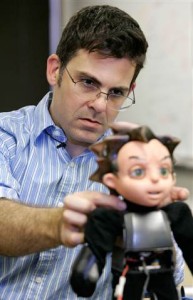Upon hearing the term “robot” and pondering its history, it may be assumed that many would deem it more of a modern concept. However, artificial humans and autonomous artificial servants have a long history in human culture since being discussed as far back as 3500 BC by Homer in his epic poem The Iliad.
The term robot was not coined until the 1920s, though many self-navigating humans and machines have been referred to in a myriad of ways for thousands of years. However, the modern conception of robots as mobile machines with artificial intelligence came about more recently.
RoboKind is a leader in the industry of robotics with top experts in the areas of robotics, artificial intelligence, mechanical, electrical and software engineering. Over the past several years, the industry of robotics has advanced to such great magnitudes and continues to do so. Many experts in the industry of robotics generally create robots to move for primary functions, such as picking up heavy items or operating different machines. The creators at RoboKind take it a bit further.
Not only do the experts at RoboKind create robots to perform similar functions, they also utilize advanced technology to make their products more human-like. Through years of research, the creators have noted the potential benefits to this lifelike technology compared to its more “basic” competitors. Unlike basic robots, the more human-like ones grant benefits among individuals on the autism spectrum in the area of social skills, for example. As a result, Robots4Autism was founded to focus on such practices.

After acknowledging such potential, they collaborated with several autism experts and after nearly a decade of research and collaboration, they came out with Zeno: The Social Robot which uses innovative robot-generated instruction to improve a child’s social behaviors in a natural context. It has been scientifically proven that many children may not improve their social behaviors by interacting with another child or adult due to stress and frustration, thus their social skills may suffer. However, with Zeno: The Social Robot, children have the ability to simultaneously interact in a natural, more thrilling context while working on their social skills, all without the stressors common among human interaction. With Zeno, children are intrinsically motivated and engaged at a much faster pace compared to other therapy practices.
Check out these features unique to Robots4Autism:
- Fully expressive face: has a full range of facial muscles permitting a broad display of expressions including:
- Smile, frown, blink, angry, surprised, happy, sad
- Humanoid Body: has the ability to walk and move its arms, and eyes that move naturally
- Technology:
- A high-definition camera
- Internal computer
- Microphones
- Multiple sensors to detect touch, faces, track motion, etc.
- Speech and ability to converse in a variety of voices and languages
- CompuCompassion: a feature funded by the National Science Foundation, that models emotional state of a user throughout an interaction. Here are more aspects unique to this feature:
- It records interaction for analysis,
- Has ability to make decisions based on individual’s observed emotional state,
- Estimates and confidence values can be delivered to a facilitator to assist with real-time decision making.
For more information on this innovative product be sure to check out their website at www.robots4autism.com.
